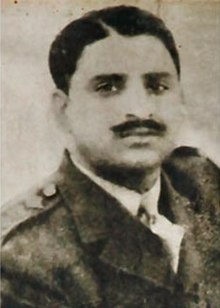Shah Nawaz Khan | |
|---|---|
 | |
| Born | 24 January 1914 Matore, Punjab, British India (present-day Punjab, Pakistan) |
| Died | 9 December 1983 (aged 69) Delhi, India |
| Allegiance | British India (until 1942) Azad Hind (1943 – 1945) |
| Battles / wars | |
| Spouse(s) | Karim Jaan |
| Children | Mahmood Nawaz Khan Akbar Nawaz Khan Ajmal Nawaz Khan Mumtaz Begum Fehmida Khanum Lateef Fatima Khan (adopted) |
| Relations | Shah Rukh Khan (nephew)[1][2] Zaheer-ul-Islam (nephew) |
Shah Nawaz Khan (January 1914 – 9 December 1983) was an Indian politician who served as an officer in the Indian National Army (INA) during World War II. He was profoundly influenced by Subhas Chandra Bose's speeches asking POWs to join the Indian National Army and to fight for a free India, Khan led the army into North-Eastern India, seizing Kohima and Imphal which were held briefly by the INA under the authority of the Japanese.[3] In December 1944, Shah Nawaz Khan was appointed Commander of the 1st Division at Mandalay. After the war, he was tried, convicted for treason, and sentenced to death in a public court-martial carried out by the British Indian Army. The sentence was commuted by the Commander-in-chief of the Indian Army following unrest and protests in India. After the trial, Khan declared that he would henceforth follow the path of non-violence espoused by Mahatama Gandhi and joined the Congress party. Having successfully contested the first Lok Sabha in 1952 from Meerut, Khan had an illustrious parliamentary career. He was elected four times to the Lok Sabha from Meerut constituency in 1951, 1957, 1962 and 1971. He lost in the 1967 and 1977 Lok Sabha election from Meerut.
- ^ "How SRK's Pathan father fell in love with his South Indian mother - Times of India". The Times of India. 6 August 2013.
- ^ "Army denies new ISI chief related to Shah Rukh Khan". 11 March 2012.
- ^ Cite error: The named reference
Tariquewas invoked but never defined (see the help page).